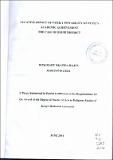Negative impact of family instability on pupil's academic achievement: A case study of Buuri District.

View/
Date
2014-06Author
Julius, Rosemary Nkatha
Type
ThesisLanguage
enMetadata
Show full item recordAbstract
Family relations and interactions have a strong and permanent influence upon a personality. Family structure affects pre-school readiness. It affects educational achievements at elementary, secondary and college levels. How parents treat their children has a direct impact on how children eventually see themselves. Children who are rejected by their parents, who grow up in homes with considerable conflicts, or who are inadequately supervised, are at the greatest risk of becoming delinquent. Whether a child's parents are married, divorced, single, remarried or cohabiting has a significant influence on children's educational performance. The purpose of this study is therefore to investigate the negative impact of family instability on learning among primary schools pupils in Buuri district. The researcher adopted descriptive survey and data collected using questionnaires. The target population was 20,982 respondents from 116 primary schools. A sample of 642 respondents was adopted. Simple random sampling was used to get 600 pupils from 21 schools, which was sampled using purposive and simple random methods. Twenty-one headteachers and twenty-one guidance and counseling teachers were purposively sampled from the twenty-one sample schools. The instruments were tested using test-retest formula. Data was analyzed using frequencies and percentages. The findings of the study revealed that most pupils came from unstable homes. Only 51 % of pupils came from relatively stable families. The rest, 49 %, either came from single-parent families, are orphaned, live with step parents, or their fathers are polygamous. This resulted to numerous challenges on the pupils, such as, lack of adequate attention from the available parent as well as chronic absenteeism from school. This consequently led to poor academic achievement.
Publisher
KeMU
